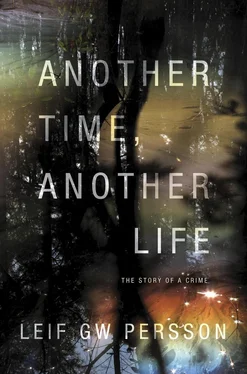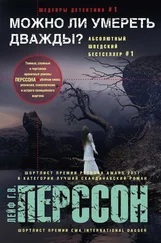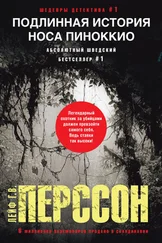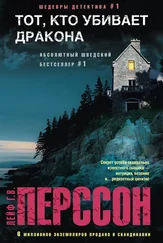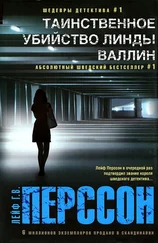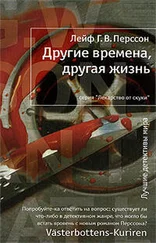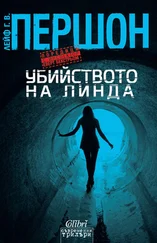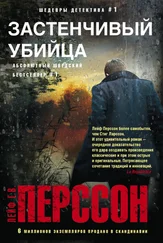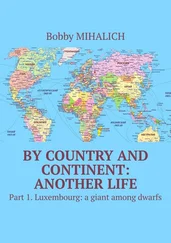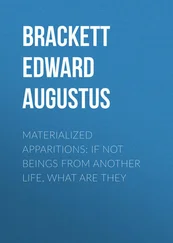Stridh was home, of course. Within the corps he was known for being something of a comp time equivalent to soccer’s Diego Maradona, so it was obvious that he would be home on a Friday when even a child could figure out that there was likely to be a lot of police work over the weekend.
“You’re probably wondering why I want to talk with you,” said Wiklander collegially when the introductory preludes were over and the mandatory coffee was on the kitchen table.
“I have my suspicions,” said Stridh.
“You do,” said Wiklander.
“Yes,” said Stridh. “I’ve worked more than thirty years as a cop, and all that time I’ve had a visit from SePo only once before — that was Persson — that big fat guy, you know — and that was more than ten years ago, so I’m guessing you’re here for the same reason. West German embassy?”
“Yes,” said Wiklander. “I want to talk with you about your observations in connection with the events at the West German embassy in April of 1975. Unfortunately I can’t go into why and you can’t tell anyone that we’ve even seen each other either — much less had this conversation — but I’m sure you already know all that,” Wiklander concluded, softening the whole thing by nodding and smiling.
“Yes,” said Stridh. “I’ve been around awhile so I do know that. As I’m sure you’re also aware, I wrote a few pages about the matter, it was the day after — let’s see, that would be the twenty-fifth of April 1975. I assume you’ve read them?”
“Unfortunately not,” said Wiklander, who had decided to save time and put his cards on the table as far as possible. “Your papers seem to have disappeared in one of our archives.” You could put it that way, he thought.
“Yes, that’s really strange,” said Stridh. “The very idea of an archive is that it should be a way to ensure that that sort of thing doesn’t happen, but sometimes you almost wonder if it isn’t the other way around. I have a certain interest in history,” said Stridh. “To be completely honest, it’s probably my major interest in life.”
“You wrote a memo,” Wiklander reminded him. Pull yourself together, old man, he thought.
“I even made a copy of it,” said Stridh smugly, “so in this case I can actually help you repair the damage... as regards the failure in the archiving,” Stridh clarified. “This is perhaps not completely in accordance with the rules, of course,” he continued, “but considering it’s for a good cause... Besides, I had the idea that maybe I had been involved in a historic event and because history is my big interest—”
“That’s just great,” Wiklander interrupted, smiling amiably. “But perhaps you should start by telling me a little about the background, and then... we can look at the papers later.”
“Sure,” said Stridh. “I’m happy to do that.”
Then Stridh talked about the mysterious car that he had stopped. About his conversation with the doorman at the Norwegian embassy and the purely general speculations he’d had before, during, and after what had happened on Thursday the twenty-fourth of April 1975. Not unexpectedly, he took his sweet time doing so.
“That was a dreadful story,” Stridh declared. “I remember I was thinking about what Churchill said to his countrymen during the war. The Germans probably should have taken that to heart a little more than they did.”
“What do you mean?” asked Wiklander, who happened to think of his old history teacher from secondary school at home in Karlstad. Stridh could be a brother to old Nightcap, thought Wiklander.
“Well, if you believed the newspapers, the colleagues at Sec — or SePo, as it seems to be called these days — warned them that something was up,” Stridh clarified.
“I was thinking about what you said about Churchill,” Wiklander reminded him. Just as confused as old Nightcap, thought Wiklander. They must be twins or at least spiritual brothers.
“Yes, him, yes,” said Stridh, nodding. “What I was thinking about was how he said that ‘he who is forewarned is also forearmed.’ ‘He who is forewarned is also forearmed,’ ” Stridh quoted solemnly. “I think that what happened to the Germans shows — if nothing else — what can happen if we don’t learn from history. Or what do you think?”
“Well... yes,” agreed Wiklander. “Maybe we should look at those notes you wrote.” And preferably before summer gets here, he thought.
In its essentials, the memo Stridh had prepared was exemplary. One might have opinions about the organization, use of language, and his typing skills, but if you disregarded that and directed yourself to the police-related meat and potatoes, it was basically unobjectionable.
He had noted the license number of the car he had stopped as well as the time and place. He had looked up the car himself in the vehicle registry. A large 1973 Mercedes that was registered to a pediatrician in private practice by the name of Rolf Stein whose address at that time was on Riddargatan in the Östermalm neighborhood.
The driver’s name he had evidently committed to memory well enough that the following day he managed to find him in the driver’s license registry. His name was Sten Welander, and he was born in 1947 and got his driver’s license in 1965.
All this was good enough, but Stridh had done more than that; he had made a serious attempt to identify the younger female passenger Welander had with him. According to Stridh “the young woman in question was probably one Helena Lovisa Stein, known as Helena, whose registered address was the same as the above-named Stein, Rolf. Helena Stein, born on September 10, 1958, was the daughter of the above-mentioned Stein, Rolf.”
“Perhaps you’re wondering why I think that?” Stridh asked.
“Wonder what?” said Wiklander, who was starting to experience a certain lack of concentration.
“That the girl in the car was the same as a certain Helena Stein,” Stridh clarified. “Perhaps you’re wondering why I think that?”
“Yes,” said Wiklander, nodding energetically. “How did you come to that conclusion?” I’ve got to pull myself together, he thought. I’m the one who’s doing the questioning.
“Well,” said Stridh, clearing his throat, “as I told you, she mentioned something — when I stopped their car — about it being her parents’ car, or else she said that it was her father’s car — but it was one of the two — so that was my starting point, and then—”
“So you looked her up in the census,” Wiklander quickly interrupted.
“Exactly,” said Stridh, actually looking a bit disappointed.
“But that’s just great,” Wiklander said sincerely. “I’m very grateful for your assistance.”
“As you see in my memo I tried to make a description of her features,” Stridh added, “so my suggestion is that you try to retrieve a school photo or something of her from that time and compare it. But I’m actually rather sure — Stein had only one daughter and it was Helena. Extremely cute girl actually. I have a very good memory for faces, so if you produce a photo of her you’re welcome to come back.”
“I thank you for that offer,” said Wiklander evasively, and he had already stood up. Come back here? God help me, he thought.
When Wiklander finally returned to the relative safety and peace of his desk he pondered the conceivable “fourth man.” Wiklander had no great problem with the fact that “he” would probably prove to be a young woman. Many of the most active members of the European terrorist movements at that time had been women.
On the other hand she was far too young even for that, Wiklander thought. Sixteen years old when the embassy drama took place, or sixteen and a half if you were to be exact the way little children always were when stating their age. Regardless of which, she was too young in a strictly criminological sense, and the only reasonable explanation must be that she had been dragged into something she didn’t completely understand, for in that case it was more of an advantage the younger you were, he thought. A radical, politically involved sixteen-year-old? Sounded both probable and correct. A sixteen-year-old who could have taken an active part in the most spectacular political attack in Swedish postwar history and the cold-blooded murder of two people? Forget it, thought Wiklander, who had a daughter the same age himself. She must have been taken in.
Читать дальше
